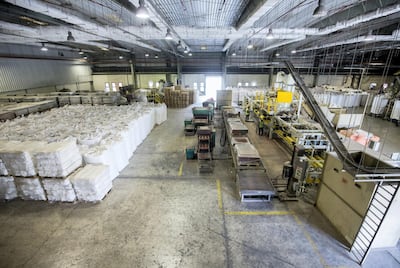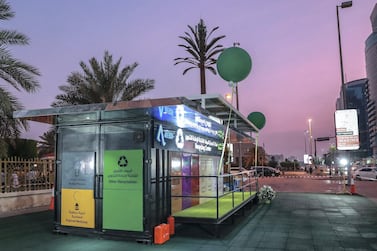Robots that use artificial intelligence to sort rubbish, a fleet of Tesla waste collection lorries and a headquarters in one of the world's smartest buildings – Sharjah seems to have everything it needs to hit its zero waste target for 2021.
The one thing that’s missing? A population that sorts its rubbish.
After decade of public awareness campaigns, including four years of door-to-door education, Sharjah residents still won't separate paper from plastic.
“Unfortunately, even with all the investment we put into [raising] awareness, we still have a long way to go,” said Khaled Al Huraimel, chief executive of Sharjah waste management company Bee’ah.
“It’s a continuous process and that’s why we’re investing in infrastructure, but we hope with time we’ll see more active participation from the community.”
Mr Al Huraimel stood inside the warehouse known as the tipping room, where 1,500 tonnes of solid waste from Sharjah city are processed every day. That is a fraction of the action on the four square kilometre site, where more than 8,000 tonnes of waste arrive every day.
In one yard, construction waste is crushed. In another barrels of chemical waste are treated.
There is a scrapyard with a shredder that splinters cars in 60 seconds and a warehouse where tyres are frozen and pulverised into rubber tiles or exported as raw material.
Sharjah's waste management wasn't always this good. Just more than a decade ago, waste disposal consisted of a dump in the desert, a small mountain of construction debris, household rubbish and tyres that grew higher by the day.
Things turned around in 2007 when the government founded Bee’ah, a public-private environmental company. Its waste recovery facility, the largest in the region, opened in 2009.
A decade on, Be'eah's landfill diversion rate – the proportion of waste that does not end up in landfills – of 76 per cent is the highest in the Middle East.
This is no small feat: the UAE is a prolific producer of rubbish, with each person accounting for 2.5 kilograms of municipal waste a day. The lion's share is attributed to the construction and industrial sectors.
Household rubbish ends up on a 20-metre conveyor belt where it is processed by five mechanical sorters.
Bee’ah plans to pioneer AI sorting robots in the near future, which will scan and separate waste more quickly and accurately.
But recovery would be far higher if people would sort their waste at home first.
“Definitely in terms of reduction of waste, we still have a problem that a lot of waste doesn’t come to us clean,” said Mr Al Huraimel. “If the waste came to us clean, it wouldn’t need all these resources.”
The Emirates presents a unique challenge as 89 per cent of the country are expatriates from diverse backgrounds, without permanent residency.
There are also no punitive measures if people simply decide not to sort their rubbish.

“The community is very supportive but it’s continuous awareness that we have to keep doing because the demographics of the UAE are very unique,” said Mr Huraimel.
“We actually visited every single villa. It took us four years.”
Now, the emphasis is on using materials recovered through local processing instead of shipping recycling and waste by-products overseas.
Countries can no longer rely on exporting their recycling.
China processed half the world's waste for 25 years but banned the import of most plastics and other waste materials in January last year.
Other Asia countries have considered doing the same.
In a country such as the UAE where natural resources such as wood are limited, local processing also makes economic sense. Currently, paper is reprocessed but most recycling is still shipped overseas.
In the future, whatever can be recovered at Bee’ah will be incinerated at a waste-to-energy plant that burns up to 37.5 tonnes of rubbish an hour and can produce 30 megawatts of energy a year, enough to power 300 homes.
This will feed the Sharjah Electricity and Water Authority grid when it opens in 2021.
Bee'ah ordered a fleet of 50 Tesla electric lorries for long-haul waste collection, to run alongside its fleet of 1,200 collection vehicles.
Next year, Bee'ah will move into new dune-shaped headquarters, designed by the late Zaha Hadid, powered by renewable energy and fitted with the latest AI technology.
The building will record minutes at meetings, guide guests to conference halls and optimise ambient settings in each room according to the personal preferences of employees.






